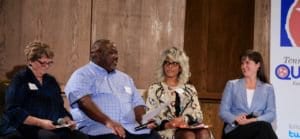Calling reading the “equity issue of our time,” Education Commissioner Candice McQueen said Thursday that Tennessee will increase its literacy rates when it improves the quality of its early education programs.
The state has been waging war on illiteracy for years but is zeroing in on pre-K and other early education programs as the best vehicles to get 75 percent its third-graders reading on grade level by 2025. Currently less than half of its students are there.
Beginning this year, the state attached more strings for local districts to receive pre-K funding, tying the amount received to the quality of programming instead of the volume of students.
But McQueen said the state still has a lot to learn about developing young readers, and data is key.
“Before kids get to third grade, we have very little information statewide with whether or not those students are on track,” McQueen said. “We have very little data statewide to know where we should be putting investments.”
The state is seeking to fill that void by working with local leaders to better track its youngest students to determine what’s working best. In Memphis, Porter-Leath is taking the lead in that effort. The nonprofit organization opened a major pre-K center this year to serve as a teacher training hub to bolster the quality of all of the city’s pre-K classrooms.

McQueen was part of an early reading panel discussion hosted in Memphis by Tennesseans for Quality Early Education and the PeopleFirst Partnership. The event featured Shelby County Chief of Schools Sharon Griffin, state Rep. Mark White, Shelby County Mayor Mark Luttrell and Tennessee first lady Crissy Haslam, who has championed literacy during her husband’s administration.
Since launching its Read to be Ready initiative last year, Tennessee has invested $30 million in summer reading camps and another $4.2 million in a coaching network to support teachers with literacy instruction.
The stakes are high because reading is foundational to lifelong learning — and is critical to closing the achievement gap.
“When kids are not reading on grade level by third grade, they are four times less likely graduate high school,” McQueen said. “Kids scoring in the lowest proficiency level on literacy almost never catch up. Guess who is in that bottom level? Students who are African American. Students who are Latino. Students with disabilities. Students who are English language learners.”



